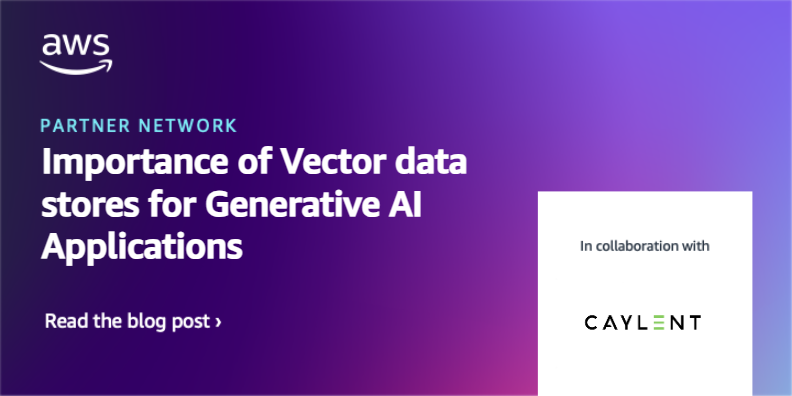Unlocking the Power of Generative AI with Vector Stores
By Milan Thanawala, Ryan Gross, and Mark Olson
Introduction
As businesses increasingly explore the realm of generative AI applications, the demand for efficient methods to store and retrieve high-dimensional vector data is on the rise. Unfortunately, traditional databases are falling short when it comes to managing this type of data and executing similarity searches. Enter specialized vector data stores—designed to seamlessly integrate with existing databases while tackling challenges around performance, security, and scalability.
In this article, we’ll delve into the key aspects of selecting a vector store and discuss how Caylent can be your partner in leveraging generative AI, supported by deep AWS expertise and comprehensive guidance on implementing these innovative solutions.
What are Vector Stores?
Vector stores, or vector databases, are tailored for the fast storage and retrieval of high-dimensional vector representations. They’ve gained immense popularity thanks to the growing use of machine learning and natural language processing, which utilize vector embeddings to extract meaning from data.
Think of vector embeddings as dense numerical snapshots of information—whether it’s text, images, or other unstructured forms. These embeddings capture the nuances of data in a way that allows similar data points to be clustered together in a multi-dimensional space.
Why Vector Stores Matter in Generative AI
In the landscape of generative AI, vector stores facilitate the efficient handling of domain-specific data as vectors. They allow for quick similarity searches to surface relevant information when users query, improving the contextual responses generated by language models (LLMs).
From enabling tasks in natural language processing—like semantic search and question answering—to bolstering recommendation systems, vector stores are at the heart of numerous applications:
- Natural Language Processing: Supporting tasks like text summarization and semantic understanding.
- Recommendation Engines: Enhancing product and content suggestions based on user behavior.
- Computer Vision: From image similarity to facial recognition, they empower machine understanding of visual data.
- Anomaly Detection: Key in identifying irregular patterns in data that may indicate fraud or system failures.
- Bioinformatics: Crucial for studies involving genomic data analysis.
Vector stores not only support AI models in comprehending and generating high-quality outputs but also drive interdisciplinary research. Pre-trained embeddings from these stores allow researchers to jumpstart their models with extensive prior knowledge, enhancing productivity and performance.
Integration with Traditional Data Stores
While traditional databases excel at handling structured data, they often struggle with high-dimensional vectors and the complex queries that come with them. This is where vector stores shine.
However, integrating vector stores with operational databases can be tricky. Challenges such as maintaining data consistency, managing performance impact, and ensuring compatibility are all crucial factors to consider. Implementing proper security measures and preparing for scalability are equally essential to a successful integration strategy.
Popular choices in the realm of vector data stores include Amazon Aurora with the pgVector extension, Amazon OpenSearch, and purpose-built solutions like Pinecone, Weaviate, Milvus, and Vespa.
Choosing the Right Vector Data Store
When evaluating vector data stores for your generative AI applications, consider these key characteristics:
- Scalability: The ability to efficiently manage billions of high-dimensional vectors.
- Performance: Look for high throughput, low latency, and optimized storage use.
- Advanced Indexing Techniques: Options like HNSW and IVFFlat can enhance search accuracy.
- Hybrid Search Capabilities: Effective combining of vector similarity with other query types can lead to nuanced results.
A Real-World Example: Enhancing Healthcare Technology
Caylent recently partnered with a leading provider of Healthcare Technology Management (HTM) to improve the efficiency and accuracy of their field technicians. With an extensive range of biomedical equipment to maintain, technicians required immediate access to accurate operational instructions.
Caylent implemented a digital assistant leveraging Amazon Bedrock, S3, OpenSearch, and AWS Lambda. By hosting a vector store with OpenSearch, the solution allowed technicians to retrieve specific instructions from thousands of technical manuals nearly instantly, ensuring they have access to accurate and vital information while on the job.
Conclusion
In the evolving landscape of generative AI, vector data stores play a pivotal role in helping machines understand and manipulate complex data. They’re transforming how industries—from e-commerce to healthcare—leverage AI to gain insights and drive practical applications.
Whether it’s analyzing patient similarities or detecting financial fraud, vector stores are integral to modern AI systems. With the journey of generative AI set to expand further, selecting the right vector data store that can effectively integrate with traditional operational systems will be paramount.
Call to Action
If you’re ready to explore the potential of generative AI for your business, Caylent is here to help. Our expertise lies in operationalizing generative AI on AWS and building secure, AI-enabled applications.
With our AI Innovation Engine, we can fast track your development process, guiding you from idea to impact through rapid prototyping and production releases.
The AI Buzz Hub team is excited to see where these breakthroughs take us. Want to stay in the loop on all things AI? Subscribe to our newsletter or share this article with your fellow enthusiasts.




